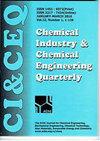微藻浓度和pH对絮凝剂微滤的影响
IF 0.8
4区 工程技术
Q4 CHEMISTRY, APPLIED
Chemical Industry & Chemical Engineering Quarterly
Pub Date : 2022-01-01
DOI:10.2298/ciceq220125032m
引用次数: 0
摘要
为了使藻类生物量成为燃料和生物产品的合适原料,必须设计一种实用的方法来脱水和浓缩藻类细胞。在本研究中,在低成本的陶瓷基板上开发了一种由微滤膜和絮凝剂组成的系统,用于高效收获斜四角蝇。研究了单宁基絮凝剂浓度、微藻浓度和pH对微滤的影响。通过实验计算了5400s的渗透通量,分析了总阻力和结垢机理。结果表明,饼式过滤模型最能反映数据。在pH为4和0.06 kg/m3的微藻(添加絮凝剂)条件下进行的实验结果表明,微藻的渗透通量/初始通量降低了39%。在最佳条件下,考察了临界通量、跨膜压力和污染机理对微滤的影响。将步进法应用于临界通量,得到渗透通量为2.2 ?纯m3m 2 s ? 1。70 kPa条件下渗透通量最高,为3.0 ?10?5 m3m?2s?1),通过改进的Hermia模型获得了较低的饼孔阻塞系数(k)。本研究表明,在低pH下使用Tanfloc可以最大限度地分离膜工艺中的微藻。本文章由计算机程序翻译,如有差异,请以英文原文为准。
Effects of microalgal concentration and pH with flocculant on microfiltration
To make algal biomass a suitable feedstock for fuel and bioproducts, a practical way of dewatering and concentrating algal cells must be devised. In this study, a system comprising microfiltration membranes combined with a flocculant was developed on a low-cost ceramic substrate for efficient harvest of Tetradesmus obliquus. The effects of tannin-based flocculant concentration, microalgal concentration, and pH on microfiltration were studied. Permeate flux was evaluated for 5400 s through experiments to analyze the total resistance and the fouling mechanism. Results show that the cake filtration model best represented the data. The experiments at pH 4 and 0.06 kg/m3 of microalgae (with flocculant) showed improved results with reduction in J/J0 (permeate flux/initial flux) of 39%. In addition, the effects of critical flux, transmembrane pressure, and fouling mechanism on microfiltration were investigated under the best conditions studied. Application of the stepping method to the critical flux yielded permeate flux of 2.2 ? 10-5 m3m?2s?1. The 70 kPa condition showed the highest permeate flux (3.0 ? 10?5 m3m?2s?1) and a low cake pore blocking coefficient (k) obtained by the modified Hermia model. This study showed that the use of Tanfloc at low pH can maximize microalgal separation in membrane processes.
求助全文
通过发布文献求助,成功后即可免费获取论文全文。
去求助
来源期刊

Chemical Industry & Chemical Engineering Quarterly
CHEMISTRY, APPLIED-ENGINEERING, CHEMICAL
CiteScore
2.10
自引率
0.00%
发文量
24
审稿时长
3.3 months
期刊介绍:
The Journal invites contributions to the following two main areas:
• Applied Chemistry dealing with the application of basic chemical sciences to industry
• Chemical Engineering dealing with the chemical and biochemical conversion of raw materials into different products as well as the design and operation of plants and equipment.
The Journal welcomes contributions focused on:
Chemical and Biochemical Engineering [...]
Process Systems Engineering[...]
Environmental Chemical and Process Engineering[...]
Materials Synthesis and Processing[...]
Food and Bioproducts Processing[...]
Process Technology[...]
 求助内容:
求助内容: 应助结果提醒方式:
应助结果提醒方式:


